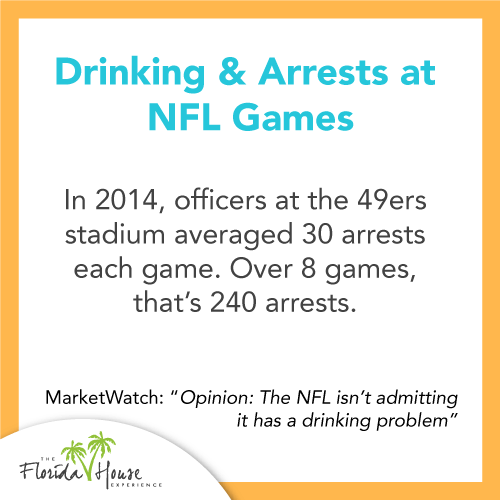
In January 1990, the Miami Dolphins made history when they announced that at their home venue, Joe Robbie Stadium, they would be reducing ticket prices in some areas and making a few sections designated “sober areas.” The stadium, now called Hard Rock Stadium, still utilizes their sober zone tickets and our Alumni community takes yearly trips to enjoy a game while seated in the sober seating. The Dolphins SoberZone got us thinking: Is this a common practice at professional sports venues in the United States? Is alcohol control a priority at sporting events? Is there a way to improve the way we treat drinking at events like this?
Examples of Sober Areas at Sports Venues
 There are additional sober areas at sporting events scattered around the country. However, indications are that the venues’ priority is something other than providing sober spaces for enjoying events to people who can’t be around alcohol and other substances because they have struggled with addiction in their past.
There are additional sober areas at sporting events scattered around the country. However, indications are that the venues’ priority is something other than providing sober spaces for enjoying events to people who can’t be around alcohol and other substances because they have struggled with addiction in their past.
Take, for example, First Energy Stadium in Cleveland, the home of the Cleveland Browns. As a city with a very passionate fanbase, the stadiums that hosted the Browns over the years had a particular reputation for being loud, rowdy and unsuitable for children. No point in time illustrated this more than “Bottlegate” in 2001, shortly after the Browns returned to the NFL after a short absence. After a series of rulings that they disagreed with, intoxicated fans started to throw bottles onto the field, at officials and even at opposing players.
This led to penalties from the league and changes in Cleveland. Today, the stadium has a “family zone” where alcohol isn’t permitted and more stringent rules in all sections about fan intoxication. But there’s a reason to believe this is more of a concern about liability than giving addicts and sober people a place to enjoy the game without having to be exposed to alcohol. Part of it has to do with the fact that these areas almost never exist in baseball stadiums, where fans aren’t known to get as rowdy and violent as at football games. For example, the other side of Cleveland is home to Progressive Field, where the “family deck” has alcohol flowing freely and basically unrestricted for adults of legal age to buy.
Restricted Alcohol Sales at Sporting Events
Sober areas at professional sporting events are few and far between, despite encouraging examples, including one in FHE Health’s backyard. But what about limiting sales of alcohol as a way to prevent problem drinking at events?
As it turns out, most professional venues have such policies in place. A national study found rules like the following: The Chicago Bears’ stadium, Soldier Field, has a policy where only one alcoholic beverage can be sold to one person at the time of purchase. This seems well-intentioned, and a closer look finds that baseball stadiums, football stadiums and even many basketball arenas have such policies. There is reason to believe that these rules are difficult to enforce, however, and that they’re broken in many cases.
On the other hand, sporting events where alcohol has traditionally been absent are now opening up the floodgates, none more notable than college football. According to one article, over the last decade, the number of college stadiums that serve beer and liquor grew from under a dozen to 52, as of the 2018 season.
What Does It All Mean?
As an addiction treatment center, FHE Health sees the risk that alcoholism presents on a daily basis. Naturally, we feel that sober spaces are necessary, even in areas where sobriety seems “unexpected,” like at professional and college sporting events. We think other stadiums should follow the lead of the Dolphins and other teams and realize that the revenue added by alcohol sales isn’t always worth risking public health.






